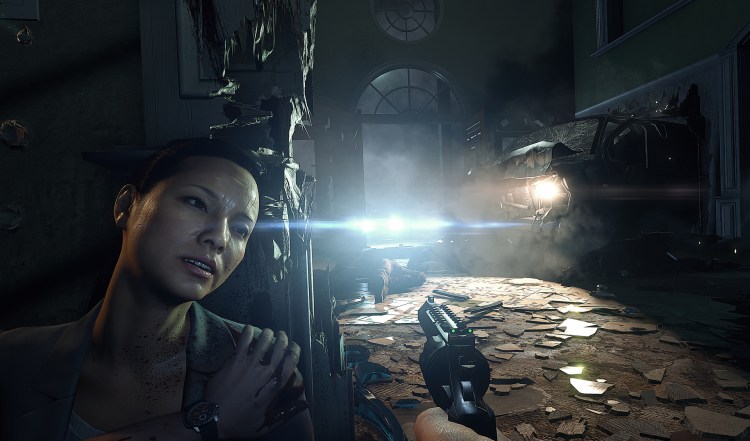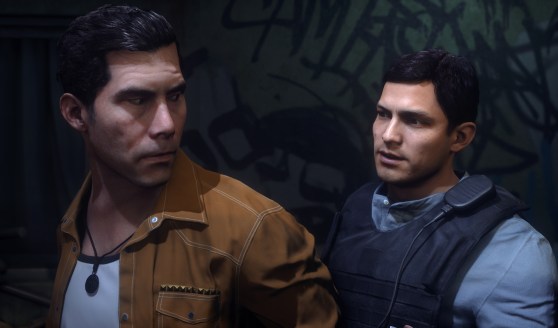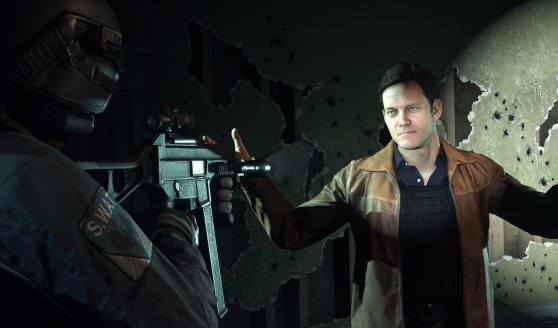GamesBeat: You’re also, in some ways, bringing down the level of weaponry that’s available to the cops. They aren’t combat soldiers out on the battlefield with tanks and everything. Or maybe they are? But they shouldn’t be quite so heavily armed.
Milham: I’d say we’ve changed the relationship to it. We have a lot of the same weapon categories. We’ve expanded the weapons quite a bit, actually. In multiplayer we have a lot of non-military stuff like sawed-off shotguns and tasers and baseball bats. We haven’t cut things so much as we’ve changed the relationship and made them more important and singular.
Things like machine guns and RPGs — which, you’re right, aren’t as core a part of the cops versus criminals fantasy — are available, but they’re harder to get and more special. When someone does have one, it’s a game-changer. You get them out of the trunks of cars and stuff like that, rather than having them as part of your basic loadout.
GamesBeat: The scanner, which tracks suspects’ locations, is powerful. Did you worry about making that too powerful, so that you can just walk around with that on all the time?
Milham: Exactly. Games have had similar sorts of things where you just walk around with them all the time exposing everything. We carefully balanced a lot of stuff. It’s not an all-powerful X-ray vision where you see every bad guy forever. It only works on line-of-sight. It does expose interesting information in the world, but we’re pretty confident that it fits into the strategy portfolio in a nice way.
GamesBeat: There’s a bit of evidence-gathering and crime-solving that you get from that.
Milham: Yeah, that’s part of the fun, part of the whole cops and criminals fantasy. Cracking the case. What else is going on here? Not just whipping out the scanner and seeing it all, but discovering things. Something about this room is funny. What’s going on over here? Then confirming and finding out more about what’s going on in the world by solving cases that sometimes go across multiple episodes.
GamesBeat: There are longer cutscenes here. Could you discuss that a little?
Milham: What we’re trying to do is keep that cop-show feel going throughout the whole presentation. We do all kinds of things. Having a lead character with a voice and an appearance that you see. Presenting him in a TV-style fashion sometimes. Blurring the lines with how we do the little TV logos in the corner and that sort of thing. It’s all live, in-engine. We try to move in and out of first-person elegantly, and we don’t want to do super-long cutscenes that take people out of the action.
GamesBeat: It’s interesting to see the diversity in the main characters. You have a woman as the partner. Is that reflecting a different kind of thinking?
Milham: I don’t know if it was any new kind of thinking exactly, so much as we just thought it was an opportunity to make things interesting. We didn’t want to just tick some ethnic boxes, because that’s not accomplishing much. Our idea was, “How can we give these characters backgrounds that would give them extra interest and perspective on the events of the game?”
Like I was saying, it’s not just like, “Hey, let’s make him Latino because we don’t have one of them.” It’s because, when you talk about the relationship between Cuba and Miami and becoming part of the authorities in Miami and what that would mean—It makes it more interesting. All the characters come from those types of perspectives.
GamesBeat: “Players First,” the new EA motto, does that apply in some way?
Milham: There are a couple of different ways. One, from the beginning of the design, we wanted to give players more agency, more choices, and not just have it be a linear roller-coaster all the time. A lot of the game is playable in different ways, with different styles. Also, when the players were giving us a lot of great feedback from the beta, taking the time to listen and implement that feedback, rather than just saying, “That’s nice,” and rushing it out.
GamesBeat: How would you describe the feeling you get from single-player as opposed to the multiplayer?
Milham: It’s always interesting. Battlefield’s DNA and tradition is in the multiplayer. That’s been the thing we wanted to get absolutely right, to deliver the things Battlefield players expect. I think we’ve done a good job of that.
Of course, part of that is this crazy emergence, the rock-scissors-paper relationship between all the different Battlefield features. It’s the broadest and deepest of all the multiplayer FPS games. You have all these different vehicles and roles and giant maps and destruction and evolution. It’s a lot of, “Holy crap, did you see that?” And the teamwork that works with all of that.
Single-player, tonally, the pacing is going to be more intentional. This section is meant to be like this. This section is meant to be like that. But more so than ever, we’ve brought some of that emergence with the different choices and things that can happen into the single-player. I think people will like that.
GamesBeat: Some people may still skip the single-player campaign.
Milham: They’re still welcome to. I think they’ll still find stuff to enjoy. Part of what we’re hoping is that people will enjoy the single-player who maybe didn’t even play the last Battlefield, who aren’t traditionally Battlefield fans. That’s cool. I think we’ve made a pretty tremendous multiplayer game. If they’re enjoying that, that’s cool too. There may even be some people who only play the single-player. We’ll see. I’m just trying to help people have fun.
VentureBeat's mission is to be a digital town square for technical decision-makers to gain knowledge about transformative enterprise technology and transact. Learn More




